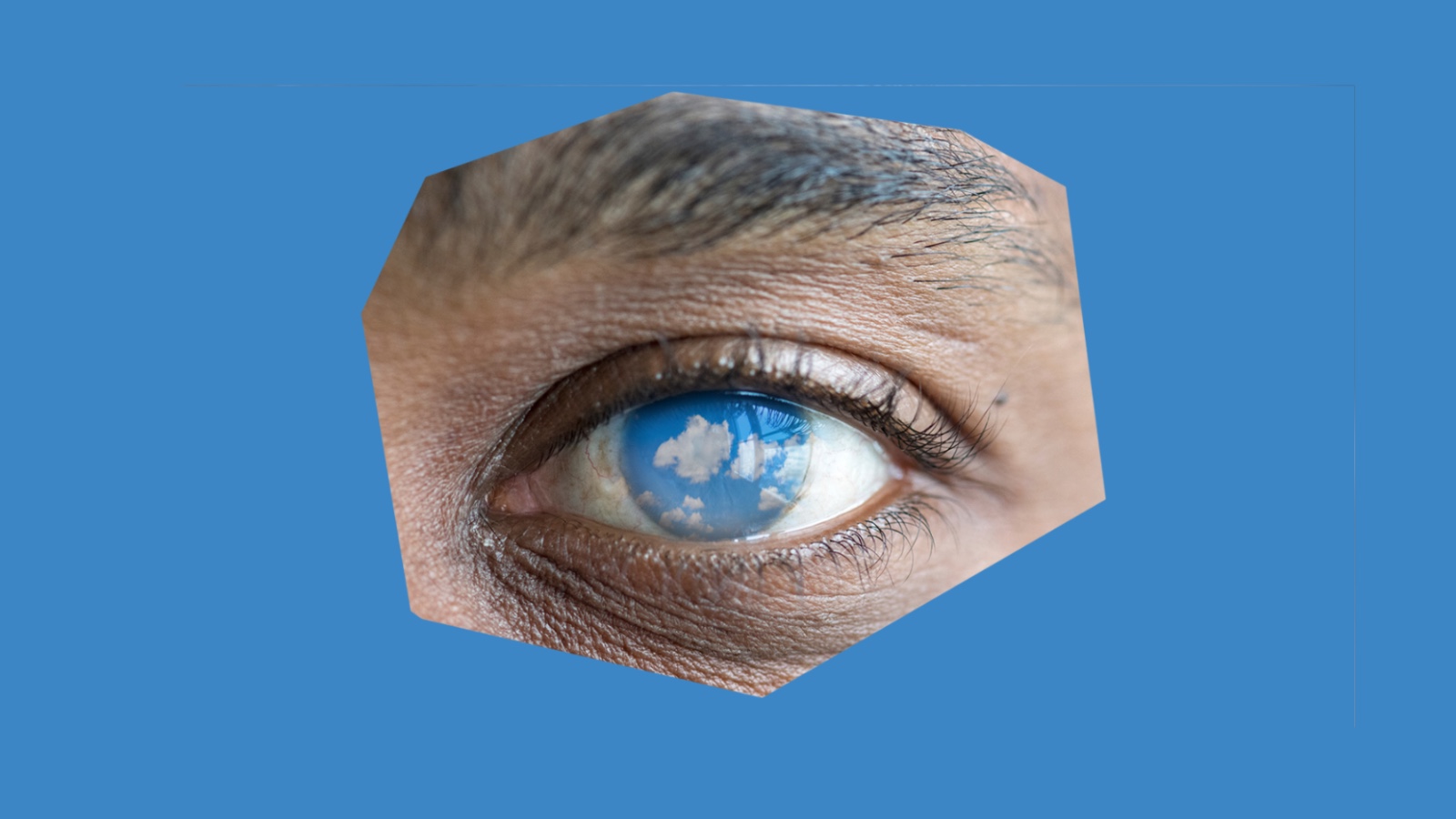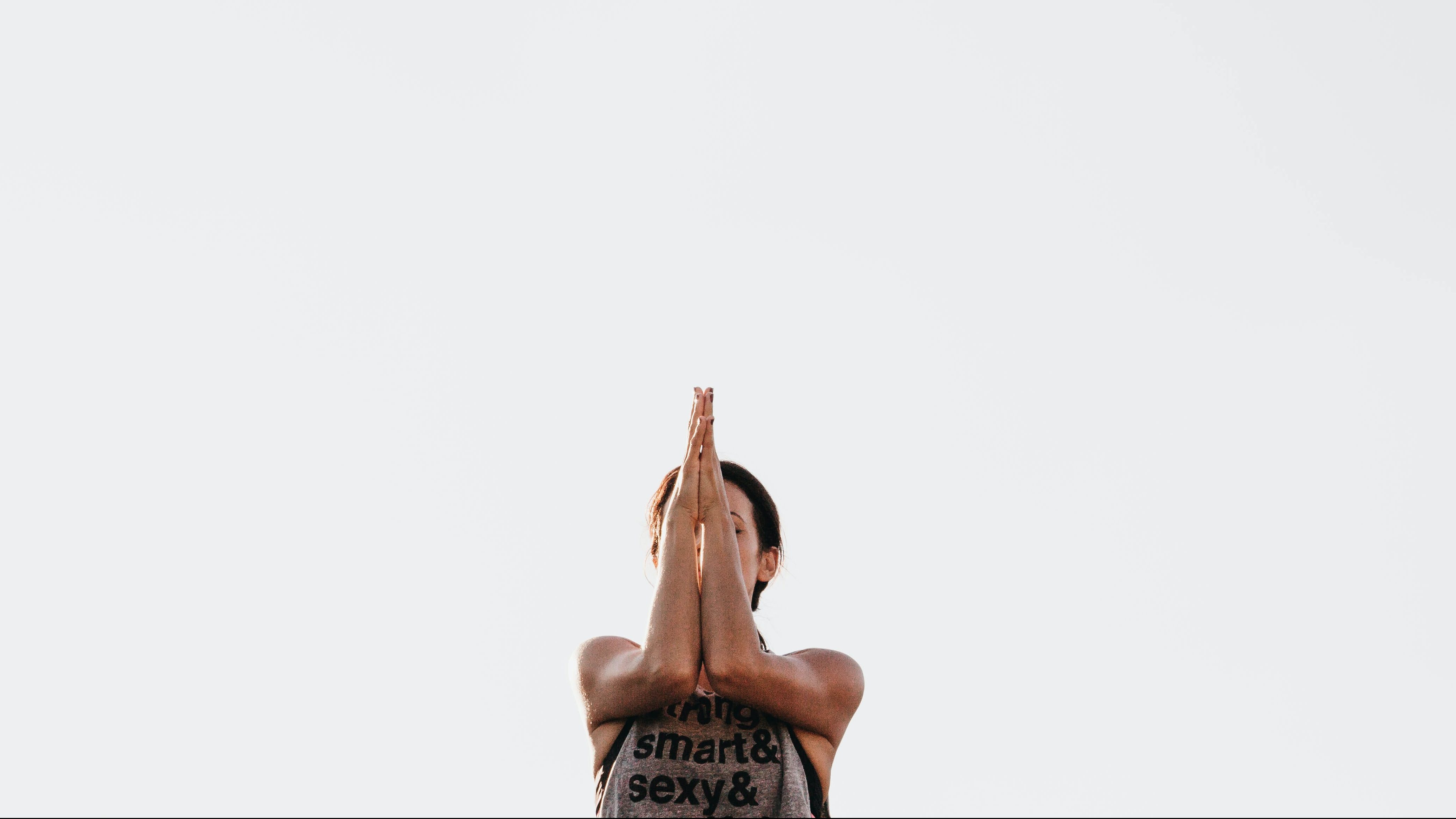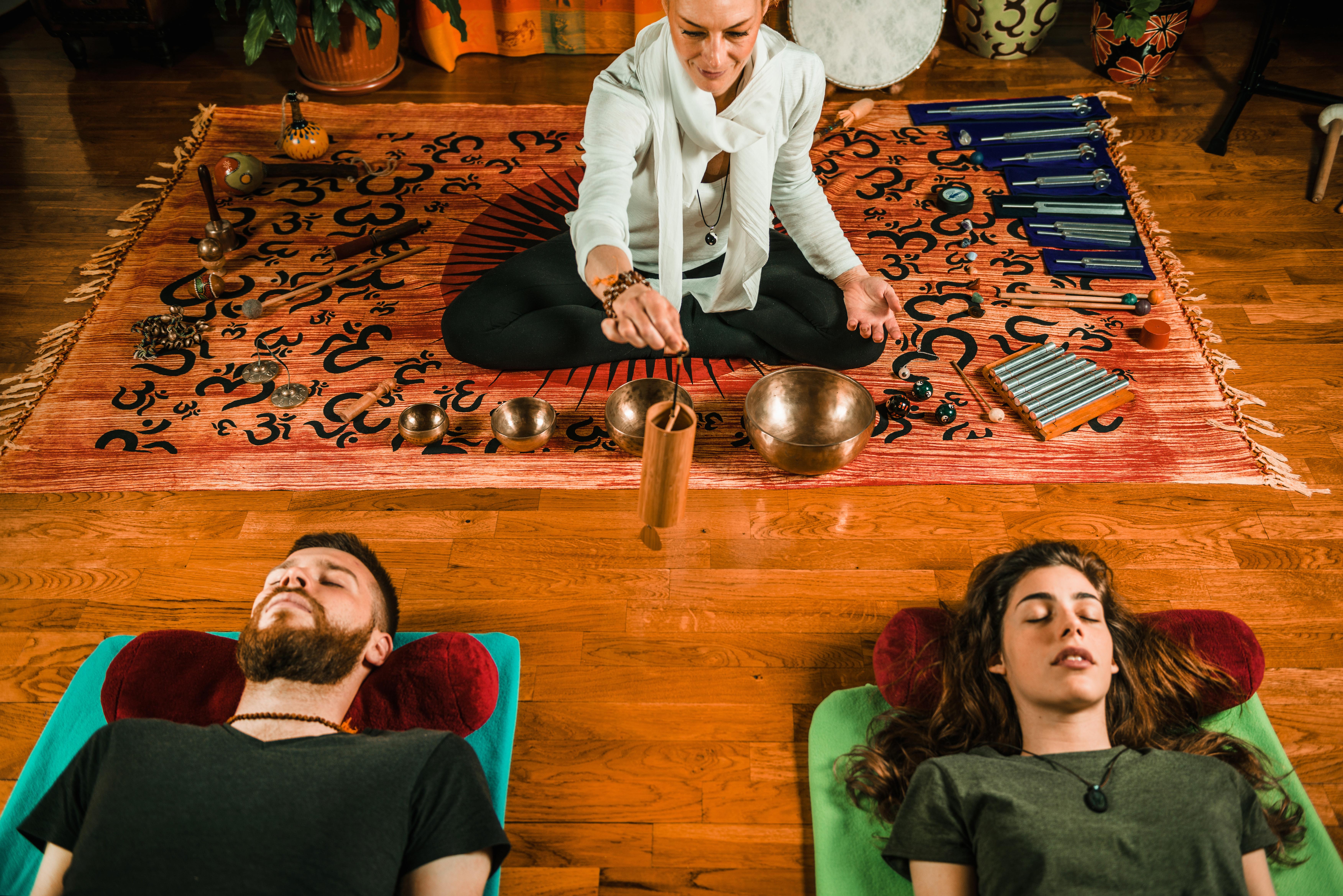RASMUS HOUGAARD: There is a general huge misconception around mindfulness. Many people think that mindfulness is a spiritual thing. Many think that it's a private thing that we do at home, and most people think that mindfulness is about slowing down. That's wrong. Mindfulness, in short terms, is really about speeding up our mental processes whereby we can be more effective with whatever we're doing, that we have this attentional muscle that allows us really to be on task with what we are doing.
EMMA SEPPÄLÄ: Research shows that our mind actually wanders about 50% of the time, and research also shows that when our mind is wandering we are never as happy as when our mind is in the present moment. So if your mind is in the future worrying about something that is going to happen, or in the past because you're regretting something or angry at somebody, you're more likely to feel more negative emotions. But when you're in the present moment, even if you're doing a task you don't particularly like, you'll actually feel happier. But also what we know is that you'll be able to be more productive when you're in that state because you're going to be naturally focused.
JON KABAT-ZINN: People misunderstand meditation as oh, I just sweep all my thoughts away and then I'm in this like nirvana. What you'll get by trying to sweep all your thoughts away is a headache at the most, because there's no way to sweep your thoughts away. They will get you every time. And then you can have millions of thoughts about mindfulness and meditation and those are just thoughts, too. They're not meditating. But when you see that you're not your thoughts then you can watch them in this kind of impersonal, more sort of if you will observing way with kindness, with self-compassion, because a lot of them are heavily loaded with negative emotion. And you can see that if you don't touch them, if you don't do anything with them, if you don't get caught in them, they self-liberate naturally in awareness. The awareness is like touching a soap bubble. It's fun for kids and fun for adults, too. A soap bubble and you touch it and it just goes poof. So I love that image. The thought is the soap bubble and the emotion, too, that's valancing the thought and you don't need to do anything with it because your awareness it's like not even a finger. It's not corporeal. The awareness, just the embracing of it or the arising of it like in the sky it goes poof all by itself. And don't take my word for it. This is something that when you sit down and you begin to watch you'll see this is not rocket science. You don't have to sit in the cave for 30 years to have that kind of experience. All you need to do is in some sense get out of your own way. Now, I'm not saying that's easy. That's really hard, but if you can have moments when you get out of your own way then you'll see that a lot of this stuff that we get so caught up in it's like it's a mirage.
SAM HARRIS: There are features of our experience that we don't notice when we're lost in thought. So, for instance, every experience you've ever had, every emotion, the anger you felt yesterday or a year ago isn't here anymore. It arises and it passes away, and if it comes back in the present moment by virtue of your thinking about it again it will subside again when you're no longer thinking about it. Now, this is something that people tend not to notice because we rather than merely feel an emotion like anger, we spend our time thinking of all the reasons why we have every right to be angry. So the conversation keeps this emotion in play for much, much longer than its natural half-life. And if you're able through mindfulness to interrupt this conversation and simply witness the feeling of anger as it arises you'll find that you can't be angry for more than a few moments at a time. If you think you can be angry for a day or even an hour without continually manufacturing this emotion by thinking without knowing that you're thinking, you're mistaken. And this is something you can just witness for yourself. Again, this is an objective truth claim about the nature of subject of experience and it's testable. And mindfulness is the tool that you would use to test it.
DANIEL GOLEMAN: Mindfulness allows us to shift our relationship to our experience. Instead of getting sucked into our emotions or our thoughts which is what happens when we're depressed or anxious, we see them as those thoughts again or those feelings again. And that disempowers them. There's actually research at UCLA that shows when you can name that feeling – oh, I'm feeling depressed again – you have shifted the activity levels neurologically in the part of the brain which is depressed to the part of the brain which notices, which is aware of the prefrontal cortex and that diminishes the depression and enhances your ability to be able to understand it or to see it as just a feeling.
SEPPÄLÄ: Meditation practices can really help you observe your mind, become aware of its tendencies. For example, its tendency to wander, and help you through that awareness of shift your attention back into the present moment. Meditation is an exercise in which you are engaging fully with the present moment. So it's a fantastic way to train your mind to be more present with what is going on right now.
KABAT-ZINN: When you start to watch the mind you'll notice that its got a lot of agendas on the greed spectrum. I mean it's – and greed is not quite the same as ambition. Greed has to do with more for me, more of what I want for me. Then there's this other thing that you'll also notice which is you're sitting there and the opposite will come up. What I don't want, what I'm afraid of, what I need to keep at the door, keep at bay, to push away. And that's collectively referred to as aversion. So we've got greed on the one hand and it is toxic. The more you're sucked into greed, the more egotistical you become, the more it's all about me, the more you're willing to lose your own ethical foundation to get a particular result, only to find that even that result is not really satisfying so you're on to the next result and it's a never ending trajectory. But nevertheless, we have to admit it's here all the time. It's not like oh, I've transcended greed. I don't think we do transcend greed, but we can transform how we are in relationship to it and with awareness the greed doesn't have to run us. So we can bring mindfulness to greed, and the greed can be attenuated or liberated. Mindfulness to aversion, and the aversion could be attenuated or liberated, or mindfulness to our own deluded nature, thoughts and emotions and so forth. And that is liberating of them. Then what do you have left? You. As pure awareness. Fully embodied. What comes next? I don't know. You're writing the script. It's not like oh, then you'll feel this and you'll fee that, and you'll be enlightened and everybody will bow down to you, and you will never have to have any kind of challenges or difficulty. The full catastrophe will evaporate forever. No, it'll be the same old, same old. Only you won't be the same old, same old. You'll be the same you. You'll have the same bank account. You'll have the same social security number. You'll have the same face in the mirror. You'll be aging every day, but you will be in wiser relationship to your possibilities.
SAM HARRIS: The enemy of mindfulness and really of any meditation practice is being lost in thought. Is to be thinking without knowing that you're thinking. Now, the problem is not thoughts themselves. We need to think. We need to think to do almost anything that makes us human – to reason, to plan, to have social relationships, to do science. Thinking is indispensable to us, but most of us spend every moment of our waking lives thinking without knowing that we're thinking, and this automaticity is a kind of scrim thrown over the present moment through which we view everything and it's distorting of our lives. It's distorting of our emotions. It engineers our unhappiness in every moment because most of what we think is quite unpleasant. We're judging ourselves, we're judging others, we're worrying about the future. We're regretting the past. We're at war with our experience in subtle or coarse ways and much of this self-taught is unpleasant and diminishing our happiness in every moment. So meditation is a tool for cutting through that, for interrupting this continuous conversation we're having with ourselves.
GOLEMAN: If you do mindfulness practice ten minutes a day or ten minutes three times over the course of a day something remarkable happens to your attention and that has to do with the fact that we're all multitasking these days. People on average look at their email about 50 times a day. They look at their Facebook 20 some times a day, and that's just the tip of the iceberg. There's Instagram, there's your phone calls, there's whatever it is you have to do. And what this means for attention is that we're challenged. That focused attention is an endangered species.
PETER BAUMANN: What happens with attention is it either goes to the highest opportunity or it goes to the highest threat that we perceive in our environment. So suddenly there is something that we in our hunter-gatherer times something that was valuable to eat and then that's where our attention goes. Or there's something like a dark shadow moving and then that's where our attention goes. It's automatic and the reason that we have attention is to pay attention and then summon all of our resources to either take advantage of the opportunity. or to avoid the threat. That's really the purpose of attention. So we zone out everything else, we kind of blank everything and just focus on one thing in that particular moment is of highest value or potentially the highest threat. There is so much happening in our lives that we pay attention to and quite frankly the little devices that we carry around don't help very much because our attention gets totally absorbed into that attraction from these little devices. And we get a little bit of dopamine all the time when we say oh, information. Information is valuable instinctively. So we want to know what's happening and what's going on and that's true for gossip and that's true for why we watch the news. But the problem is that our attention is so much absorbed in that, that we rarely, if ever, pay attention to just being present. And that is really what mindfulness and meditation is trying to balance out a little bit, so that when the mind quiets and you actually are at home in your body, then that distraction fades away and you actually get in touch with that underlying happiness that the Greeks call eudaimonia.
SEPPÄLÄ: Research shows that people who meditate can increase their attention span. In fact, in some research studies we use a task called the attentional blink task in which you show people a number of different images in very fast sequence and usually we would only pick up every fourth image. We don't actually see the others. That's why we call it the attentional blink. Well, research has shown that after meditation retreat people tend to not show that attentional blink or to show it less which is very interesting. It means that if we calm our mind we're somehow able to pick up things better in our environment which also makes sense in terms of how divided our mind is with regards to multitasking and so forth. When our mind is very settled then we're able to literally see more things, register more.
DAN HARRIS: There's also a study out of Yale that looked at what's called the default mode network of the brain. It's a connected series of brain regions that are active during most of our waking hours when we're doing that thing that human beings do all the time which his obsessing about ourselves, thinking about the past, thinking about the future, doing anything but being focused on what's happening right now. Meditators not only turn off the default mode network of their brain while they're meditating, but even when they're not meditating. In other words, meditators are setting a new default mode. And what's that default mode? They're focused on what's happening right now.
WENDY SUZUKI: We know a lot about or we're growing our knowledge about the effects of meditation, long-term meditation in people like monks that meditate for 50 or 50,000 hours in their lifetime. And we know that this completely changes the electrophysiological responses of their brains. They have much higher levels of what we call gamma waves which is a particular frequency of wave.
GOLEMAN: All of us get gamma for a very short period when we solve a problem we've been grappling with even if it's something that's vexed us for months. We get about a half second of gamma. It's the strongest wave in the EEG spectrum. We get it when we bite into an apple or imagine biting into an apple and for a brief period, a split second, inputs from taste, sound, smell, vision, all of that come together in that imagined bite into the apple. But that lasts for a very short period in an ordinary EEG. What was stunning was that the Olympic level meditators – these are people who have done up to 62,000 lifetime hours of meditation – their brainwave shows gamma very strong all the time as a lasting trait just no matter what they're doing. It's not a state effect. It's not during their meditation alone, but it's just their everyday state of mind. We actually have no idea what that means experientially. Science has never seen it before. We also find that in these Olympic level meditators when we ask them, for example, to do a meditation on compassion their level of gamma jumps 700 to 800 percent in a few seconds. This has also never been seen by science. So we have to assume that the special state of consciousness that you see in the highest level meditators is a lot like something described in the classical meditation literature centuries ago, which is that there is a state of being which is not like our ordinary state. Sometimes it's called liberation, enlightenment, awake. Whatever the word may be, we suspect there's really no vocabulary that captures what that might be. The people that we've talked to in this Olympic-level group say it's a very spacious and that you're wide open. You're prepared for whatever may come.
DAN HARRIS: There's no way a fidgety and skeptical news anchor would ever have started meditating were it not for the science. The science is really compelling. It shows that meditation can boost your immune system, lower your blood pressure, help you deal with problems ranging from irritable bowel syndrome to psoriasis. And the neuroscience is where it really gets sci-fi. There was a study out of Harvard that's shows that short, daily doses of meditation can literally grow the gray matter in key areas of your brain having to do with self-awareness and compassion and shrink the gray matter in the area associated with stress.
GOLEMAN: Beginners in mindfulness or other meditations it turns out right from the get go have a better reaction to stress. What that means is that – and we see this in brain function. The area of the brain which reacts to stress called the amygdala, it's the trigger point for the fight or flight or freeze response. It's what makes us angry all of a sudden or anxious all of a sudden. The amygdala is quieter. It's calmer in the face of stress and this lets us be calmer in the face of stress. And this is another benefit that we see right from the beginning.
LOSANG SAMTEN: We all need that peace of mind. So the peace of mind comes from the mindfulness. Through that we understand how important kindness or compassion. One mental good quality leads into the next and the next and the next. Life is not perfect. Life will never be perfect. How much we put into effort to be perfect, there is no perfect everything. We are human. Patience is wonderful to have. So, if somebody who is in your life, if he or she is so stressful and at that time sometimes not necessarily there's not much room for communicating, just be patient. Just be (breathing noise). As a human being we all need that kind of quality. But yet, again, the seeds—we all have that. We all have our patience, how much we call an impatient person, he or she has the seeds of the patience and the kindness and the compassion. All of these seeds we didn't have to buy anywhere. We have that. We all have room to grow, but we all have the seeds.
GOLEMAN: One of the most important things whether you're looking in the Christian literature or the Buddhist literature or Jewish literature or Hindi literature, it doesn't matter. All of the meditative traditions within those classical schools of thought are saying the most important thing is that you become less focused on yourself, caring only about yourself, less selfish as it were and more open to the needs of others. More compassionate, more caring, more present to other people. If you look at longer term meditators, people who've done more than say 1,000 or 2,000 hours of meditation over their entire life – and this happens naturally. Let's say you do a half hour or sit every morning before you go out for the day. Well, after a decade or two it does add up and it seems that cumulative amount does make people less selfish, less just caring about me, and more open to other people around them. More caring, more able to tune in, more able to empathize. And this also shows up in a brain change which we think is quite significant which is that the nucleus accumbens which is the focus of craving of I've got to have that drug addiction, for example, actually becomes smaller in longer term meditators. And this seems to be related to this lack of I, me, mine in how people behave and how they think in their emotional life. And we see it most strikingly, of course, in Olympic level meditators where these are people who've done 10,000 to 62,000 hours of meditation and they are genuinely selfless people but they're very nourishing, very enjoyable to be with because they pay attention to you. They really focus on the person they're with and how they can be of service or what do you need now. It's very refreshing.
SUZUKI: How do you get to be a regular meditator and the answer is, I think, start very, very small. I know for myself I have a subchapter in my book called "Confessions of a Yo-Yo Meditator" because I think I have tried all different kinds of meditation. And my big mistake early on was to try and meditate for too long at a sitting. So I would try and meditate for 20-25 minutes with no meditation experience and it was a disaster. I forced myself to do it for 30 days thinking that would be it and I would form my habit. And day 31 I took a little break and I never came back. But then when I came back again starting very, very small with things that I can just do on my own, just breathing meditation, focusing on the breath. Something that we all do at the end of yoga classes. That's what really kind of helped me build my muscle and I just have to stick with that very short meditation and build it up that way. I think people too often either start too long or don't stick with it enough, but again shorter is better.
DAN HARRIS: My powers of prognostication are not great. I bought a lot of stock in the company that made palm pilot back in 2000 and that didn't go so well for me, but having said that I'm going to make a prediction. I think we're looking at meditation as the next big public health revolution. In the 1940s if you told people that you went running they would say who's chasing you. Right now if you tell people you meditate, and I have a lot of experience with telling people this, they're going to look at you like you're a little weird most of the time. That's going to change. Meditation is going to join the pantheon of no brainers like exercise, brushing your teeth and taking the meds that your doctor prescribes to you. These were all things that if you don't do you feel guilty about and that is where I think we're heading with meditation because the science is so strongly suggestive that meditation can do really, really great things for your brain or for your body.
DAMIEN ECHOLS: This is a technique that flushes our thoughts out. If you have a song going through your head over and over or if you're reliving an argument you had with someone a year ago, if you're obsessed over something that you can't get out of your head. This technique is good for that as well as just generally meditation purposes. It doesn't have a name. I usually just refer to as the prison cell meditation, but if you're interested I'll do that. Is that okay? All right. You start by closing your eyes and then you envision yourself in a prison cell. Standing in the center of a cell, everything is white. The walls are white, the ceiling is white, the floors are white. The only thing there is in the cell other than you on the back wall is a slit of a window. And it's up so high that the only way that you can reach it, the only way you can see out of it is by gripping the window ledge high above your head and hoisting yourself up by sheer brute physical upper body strength, almost like you're doing a pull up or a chin up. So you want to bring as much tactile sensation to the visualization as you possibly can. You want to feel it as much as you can. So picture yourself walking to the back of this wall, pressing yourself against it, reaching up with your hands and gripping the edge of that windowsill with your fingertips. Try to feel what the back wall of that prison cell would feel like pressed against the side of your face, pressed against your torso.
Feel the coldness of it, the grittiness of it. And as you start to lift yourself up off the floor using just your arms, try to feel what that would actually feel like. Feel the muscles in your shoulders. Feel the muscles in your chest, in your abdomen firing, tensing as you're pulling yourself up. Try to feel what the wall would feel like as you scrape against it lifting yourself slowly by sheer strength. As your eyes crest over the rim of the window white light bursts through the window, floods through the window and obliterates everything – the cell, you, everything until there's only white light remaining. Do it again. Press yourself against the back of the wall, reach out with both hands and grip the edge of the windowsill. Feel the muscles in your chest and your abdomen, in your shoulders tensing as you start to lift yourself up. Feel the wall scrape against the front of your thighs, against the side of your face as you hoist yourself until your eyes go over the edge of the window frame and then white light comes flooding in through the window obliterating everything – you, the cell until there is only white light. Once more. Feel yourself pressed against the wall, raise your arms, hook your fingertips over the window ledge. Begin to raise yourself slowly up by sheer strength feeling the muscles in your shoulders, your chest, your torso straining as you lift your body weight. Feel the wall of the prison cell as you scrub against it. And as your eyes go over the edge of the window frame white light comes flooding in obliterating everything.
And this is one of those things you can do for as long as you have time. You can do it five times. You can do it ten times. The longer you do it, the more effective it is. And it gives you something to work with in your visualization instead of just trying to stay in the present moment which is really, really hard.






